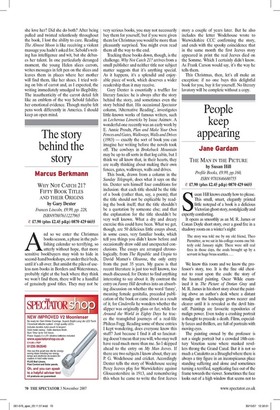The story behind the story
Marcus Berkmann WHY NOT CATCH 21? FIFTY BOOK TITLES AND THEIR ORIGINS by Gary Dexter Frances Lincoln, £9.99, pp. 228, ISBN97807611227965 E7.90 (plus £2.45 p&p) 0870 429 6655 And so we enter the Christmas books season, a phase in the publishing calendar so terrifying, so utterly without hope, that more sensitive bookbuyers may wish to hide in second-hand bookshops, or under their beds, until it's all over. But amidst the piles of useless non-books in Borders and Waterstones, probably right at the back where they think we won't find them, there will be a handful of genuinely good titles. They may not be very serious books, you may not necessarily buy them for yourself, but if you were given them for Christmas you would be more than pleasantly surprised. You might even read them all the way to the end.
Tracking these books down, though, is the challenge. Why Not Catch 21? arrives from a small publisher and neither title nor subject matter suggests that it's anything special. As it happens, it's a splendid and enjoyable piece of work, which deserves a wider readership than it may receive.
Gary Dexter is essentially a truffler for literary fancies: he is always after the story behind the story, and sometimes even the story behind that. His occasional Spectator column, 'Alternative Reading', investigates little-known works of famous writers, such as Lecherous Limericks by Isaac Asimov. A wonderful one recently was an early work by E. Annie Proulx, Plan and Make Your Own Fences and Gates, Walkways, Walls and Drives (1983) — exactly the sort of book you can imagine her writing before the novels took off. The cowboys in Brokeback Mountain may be up to all sorts in that log cabin, but I think we all know that, in their hearts, they are really thinking about making their own fences, gates, walkways, walls and drives.
This book, drawn from a column in the Sunday Telegraph, does what it says on the tin. Dexter sets himself four conditions for inclusion: that each title should be the title of a book (rather than, say, a poem); that the title should not be explicable by reading the book itself; that the title shouldn't be a quotation by someone else; and that the explanation for the title shouldn't be very well known. What a dry and dreary exercise this could have been. What we get, though, are 50 delicious little essays about, in some cases, very familiar books, which tell you things you didn't know before and occasionally draw odd and unexpected conclusions. The essays are arranged chronologically, from The Republic and Utopia to David Mamet's Oleanna, the only entry from the past 35 years. My guess is that recent literature is just too well known, too much discussed, for Dexter to find anything interesting to say about it. By contrast the entry on Fanny Hill devolves into an absorbing discussion on whether the word 'fanny', meaning female genitalia, preceded publication of the book or came about as a result of it; for Cinderella he wonders whether the slipper was originally glass or fur; while for Around the World in Eighty Days he traces the transglobal journeys of a real-life Phileas Fogg. Reading some of these entries I kept wondering, does everyone know this stuff? Just because I find it all so fascinating doesn't mean that you will, who may well have read much more than me. So I skipped ahead to the entry on My Man Jeeves. If there are two subjects I know about, they are P. G. Wodehouse and cricket. Accordingly Dexter tells the story of Wodehouse seeing Percy Jeeves play for Warwickshire against Gloucestershire in 1913, and remembering this when he came to write the first Jeeves story a couple of years later. But he also includes the letter Wodehouse wrote to Warwickshire CCC confirming the story, and ends with the spooky coincidence that in the same month the first Jeeves story appeared in print the real Jeeves died on the Somme. Which I certainly didn't know. As Frank Carson would say, it's the way he tells them.
This Christmas, then, let's all make an exception: if no one buys this delightful book for you, buy it for yourself. No literary lavatory will be complete without a copy.












































































 Previous page
Previous page